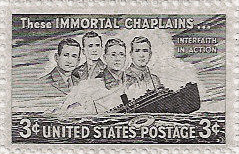In the midst of World War II, on February 3, 1943, 902 American
servicemen, merchant seamen, and civilian workers were aboard the
SS Dorchester, bound for a US military base in Greenland. At 12:55 AM,
the ship was hit by a torpedo from a German submarine. It sank in 27
minutes, with 672 men dying in the icy waters. Among the 230 survivors,
many recalled the extraordinary acts of four army chaplains on the ship:
George L. Fox, a Methodist minister; Alexander D. Goode, a Jewish rabbi;
Clark V. Poling, a Dutch Reformed minister; and John P. Washington, a
Roman Catholic priest.
The chaplains were seen comforting the wounded, offering prayers for
the dead and dying, and trying to guide people to safety. One witness,
Private William Bedner, remembered when he was overboard hearing the
chaplains on deck "preaching courage"--"Their voices were the only thing
that kept me going." When Petty Officer John Mahoney tried to find his
gloves to protect his hands against the Arctic cold, Rabbi Goode gave him
his, saying, "I have two pair," though later Mahoney realized that Goode
had given him his only pair. Together, the chaplains distributed life jackets
from a storage locker on the deck, and when it was empty, they took off
and gave away their own life jackets. Survivor John Ladd said of this, "It
was the finest thing I have seen or hope to see this side of heaven." As
the ship went down, the four chaplains were seen on the slanting deck,
arms linked, praying.
The story of the four chaplains became widely known, epitomizing not
only selfless sacrifice but action transcending religious divisions. On May
28, 1948, a US postage stamp commemorated the chaplains and bore the
words, INTERFAITH IN ACTION (--a very early use of the term
interfaith in the context of positive actions across religious lines).
On February 3, 1951, President Harry S.
Truman dedicated the Chapel of the Four Chaplains at Temple University in Philadelphia,
saying, "This interfaith shrine...[will] teach Americans that as men can
die heroically as brothers so should they live together in mutual faith and
good will." In January 1961, Congress authorized a Special Medal for
Heroism, awarded posthumously to the four by President Dwight Eisenhower.


The Special Medal of Heroism: the names of the Four Chaplains are
inscribed on the reverse. The ribbon features the blue of
the Medal of Honor ribbon, symbolizing courage, with a border of
black, for sacrifice.
